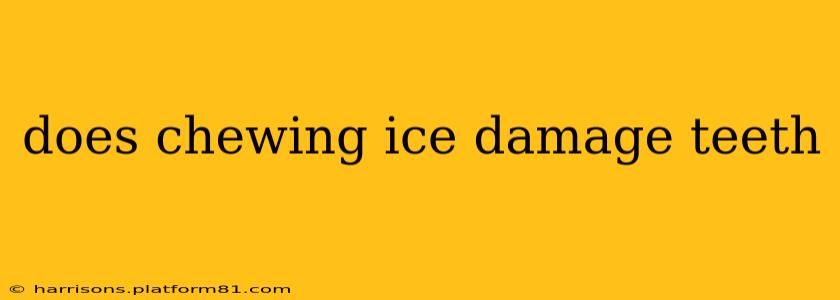Many of us enjoy the refreshing chill of chewing ice, especially on a hot day. But is this seemingly harmless habit actually damaging our teeth? The short answer is: yes, it can. Chewing ice can lead to a variety of dental problems, and understanding the risks is crucial for maintaining good oral health. This article will explore the potential damage, answer frequently asked questions, and offer advice on how to curb this habit.
What Happens When You Chew Ice?
The hardness of ice makes it an extremely abrasive substance. When you bite down on ice, the force and friction can cause several issues:
- Cracked or chipped teeth: Ice is significantly harder than tooth enamel, the protective outer layer of your teeth. The impact of chewing ice can easily fracture or chip this enamel, leading to sensitivity, pain, and potential further damage.
- Damaged fillings and crowns: Existing dental work, such as fillings or crowns, is even more vulnerable to damage from ice chewing. The force can cause these restorations to crack or break, requiring expensive repairs or replacements.
- Worn enamel: Repeated chewing of ice gradually wears down tooth enamel over time. This weakens the teeth, making them more susceptible to cavities, decay, and other dental problems.
- Increased tooth sensitivity: As the enamel wears away, the dentin (the layer beneath the enamel) becomes exposed. Dentin is significantly more sensitive to temperature changes and pressure, leading to discomfort and pain when consuming hot or cold foods and drinks.
How Can I Tell if Chewing Ice is Damaging My Teeth?
Recognizing the signs of ice-chewing damage is important for early intervention. Look out for:
- Sharp pain when biting down: This is a common symptom of cracked or chipped teeth.
- Increased tooth sensitivity: Experiencing pain when consuming hot, cold, or sweet foods and drinks can indicate enamel wear.
- Visible chips or cracks in your teeth: Carefully examine your teeth in a mirror to check for any damage.
- Discomfort or pain around existing fillings or crowns: This might suggest damage to your dental restorations.
Can Chewing Ice Cause Other Dental Problems?
While the direct damage is significant, the consequences of chewing ice can extend beyond cracked teeth and worn enamel. The weakened teeth become more prone to:
- Cavities: Damaged enamel allows bacteria to penetrate more easily, increasing the risk of cavities.
- Gum recession: The force of chewing ice can contribute to gum recession, exposing more of the tooth root and increasing sensitivity.
- Temporomandibular joint (TMJ) disorder: The repetitive jaw movements involved in chewing ice can put strain on the TMJ, leading to pain and dysfunction in the jaw joint.
Is it Bad to Chew Ice Every Once in a While?
Occasional ice chewing is less likely to cause significant damage compared to a regular habit. However, even infrequent ice chewing can still contribute to wear and tear over time. It's best to avoid it altogether to minimize any risk.
How Can I Stop Chewing Ice?
Breaking the habit of chewing ice can be challenging, but it's achievable with conscious effort and a few strategies:
- Identify triggers: Understand what situations or emotions lead you to chew ice.
- Find alternatives: Satisfy your need for a cold sensation with ice water, frozen fruit, or sugar-free popsicles.
- Be mindful: Pay close attention to your actions and consciously choose not to chew ice.
- Seek professional help: If you struggle to break the habit on your own, consider seeking guidance from a therapist or counselor.
What Should I Do if I Think I've Damaged My Teeth From Chewing Ice?
If you suspect damage to your teeth from chewing ice, schedule an appointment with your dentist as soon as possible. Early intervention is crucial to prevent further damage and address any existing problems. They can assess the extent of the damage and recommend the appropriate treatment, which might involve fillings, crowns, bonding, or other restorative procedures.
By understanding the risks and taking proactive steps, you can protect your teeth from the potentially harmful effects of chewing ice and maintain a healthy, beautiful smile for years to come.
